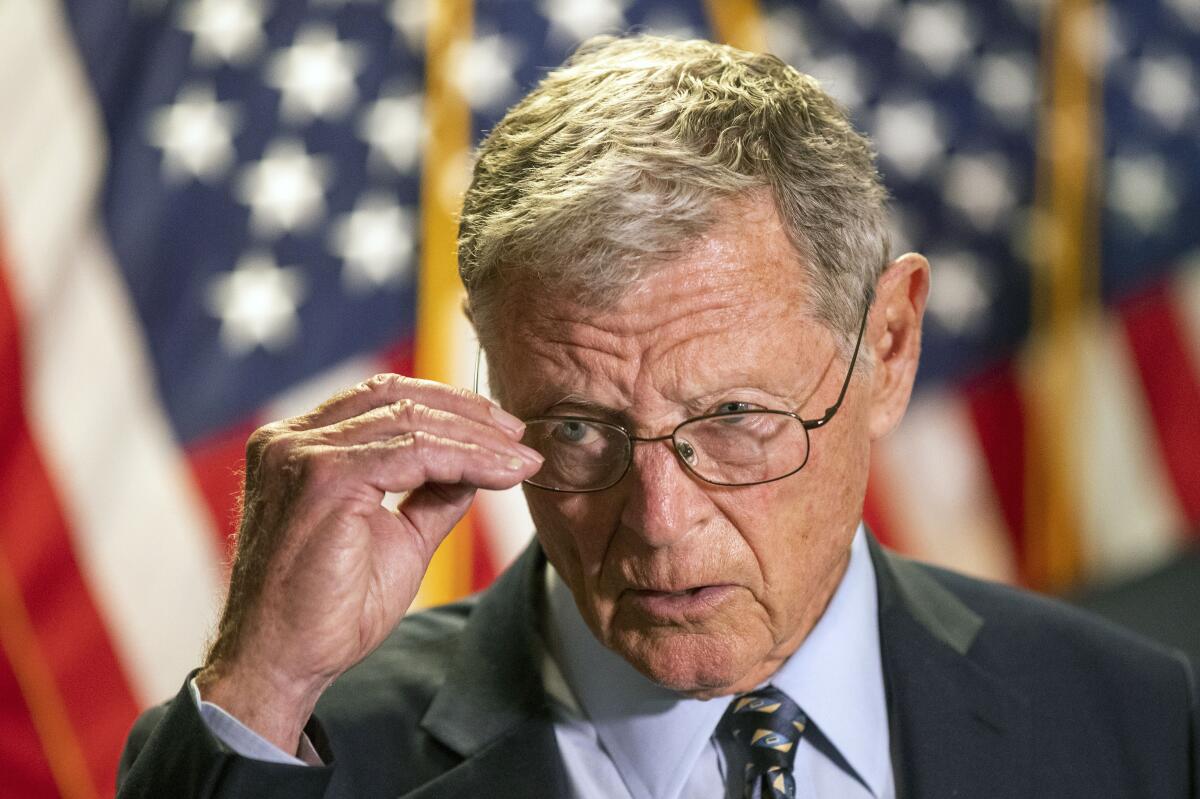Former U.S. Sen. Jim Inhofe, who called human-caused climate change a ‘hoax,’ dies at 89

- Share via
OKLAHOMA CITY — Former Sen. Jim Inhofe, a conservative firebrand known for his strong support of defense spending and his denial that human activity is responsible for the bulk of climate change, has died. He was 89.
Inhofe, a powerful fixture in Oklahoma politics for over six decades, died Tuesday morning after suffering a stroke during the Fourth of July holiday, his family said in a statement.
Inhofe, a Republican who underwent quadruple bypass heart surgery in 2013 before being elected to a fourth term, was elected to a fifth Senate term in 2020, before stepping down in early 2023.
Inhofe frequently criticized the mainstream science that human activity contributed to changes in the Earth’s climate, once calling it “the greatest hoax ever perpetrated on the American people.”
In February 2015, with temperatures in the nation’s capital below freezing, Inhofe brought a snowball on to the Senate floor. He tossed it before claiming that environmentalists focus attention on global warming as it kept getting cold.
As Oklahoma’s senior U.S. senator, Inhofe was a staunch supporter of the state’s five military installations and a vocal fan of congressional earmarks. The Army veteran and licensed pilot, who would fly himself to and from Washington, secured the federal money to fund local road and bridge projects, and criticized House Republicans who wanted a one-year moratorium on such pet projects in 2010.
“Defeating an earmark doesn’t save a nickel,” Inhofe told the Oklahoma City Chamber of Commerce that August. “It merely means that within the budget process, it goes right back to the bureaucracy.”
He was a strong backer of President Donald Trump, who praised him for his “incredible support of our #MAGA agenda” while endorsing the senator’s 2020 reelection bid. During the Trump administration, Inhofe served as chair of the Senate Armed Services Committee following the death of Republican Sen. John McCain of Arizona.
Closer to home, Inhofe helped secure millions of dollars to clean up a former mining hub in northeast Oklahoma that spent decades on the Environmental Protection Agency’s Superfund list. In a massive buyout program, the federal government purchased homes and businesses within the 40-square-mile region of Tar Creek, where children consistently tested for dangerous levels of lead in their blood.
Oklahoma Gov. Kevin Stitt, a Republican, ordered flags on state property to fly at half staff in his honor through Wednesday.
“Jim was a generational Oklahoman who relentlessly championed our veterans, never wavered in protecting our values, and a firm believer in the American Dream,” Stitt said in a statement.
Republican U.S. Rep. Frank Lucas, the senior member of the Oklahoma congressional delegation, called Inhofe a true public servant.
“His long career in the United States House and Senate serves as a testament to his strong moral compass and innate desire to better his home state,” Lucas said in a statement
In 2021, Inhofe defied some in his party by voting to certify Democrat Joe Biden’s victory in the presidential election, saying that to do otherwise would be a violation of his oath of office to support and defend the Constitution. He voted against convicting Trump at both of his impeachment trials.
Born James Mountain Inhofe on Nov. 17, 1934, in Des Moines, Iowa, Inhofe grew up in Tulsa, Okla., and received a bachelor’s degree in economics from the University of Tulsa in 1959. He served in the Army between 1956 and 1958, and was a businessman for three decades.
He was elected to the state House in 1966 and two years later to the state Senate, where he remained during unsuccessful runs for governor in 1974 and for the U.S. House in 1976. He then won three terms at Tulsa mayor starting in 1978.
Inhofe went on to win two terms in the U.S. House in the 1980s, before throwing his hat into a bitter U.S. Senate race when longtime Sen. David Boren resigned in 1994 to become president of the University of Oklahoma. Inhofe beat then-U.S. Rep. Dave McCurdy in a special election to serve the final two years of Boren’s term and was reelected five times.
Boren, a Democrat, said he and Inhofe worked together in a bipartisan manner when both were in the state Legislature. He later defeated Inhofe in a race for governor.
“While we ran against each other for governor, we were opponents but never enemies and remained friends,” Boren said in a statement. “I hope we can rebuild that spirit in American politics.”
Inhofe lived up to his reputation as a tough campaigner in his 2008 reelection bid against Democrat Andrew Rice, a 35-year-old state senator and former missionary. Inhofe claimed Rice was “too liberal” for Oklahoma and ran television ads that critics said contained anti-gay overtones, including one that showed a wedding cake topped by two plastic grooms and a photo of Rice as a young man wearing a leather jacket.
Inhofe’s bullish personality also was apparent outside politics. He was a commercial-rated pilot and flight instructor with more than 50 years of flying experience.
He made an emergency landing in Claremore in 1999, after his plane lost a propeller, an incident later blamed on an installation error. In 2006, his plane spun out of control upon landing in Tulsa; he and an aide escaped injury, though the plane was severely damaged.
In 2010, Inhofe landed his small plane on a closed runway at a rural South Texas airport while flying himself and others to South Padre Island. Runway workers scrambled, and Inhofe agreed to complete a remedial training program rather than face possible legal action.
“I’m 75 years old, but I still fly airplanes upside down,” Inhofe said in August 2010.
He later sponsored legislation that expanded the rights of pilots when dealing with Federal Aviation Administration disciplinary proceedings.
In 2016 Inhofe, then 81, walked away from a forced landing during severe weather in northeastern Oklahoma.
Inhofe is survived by his wife, Kay, three children and several grandchildren. A son, Dr. Perry Dyson Inhofe II, died in November 2013, at the age of 51, when the twin-engine aircraft he was flying crashed a few miles north of Tulsa International Airport.
Miller writes for the Associated Press.
More to Read
Sign up for Essential California
The most important California stories and recommendations in your inbox every morning.
You may occasionally receive promotional content from the Los Angeles Times.










